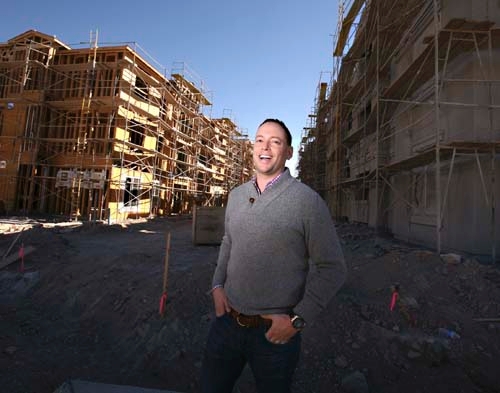‘Ghost inventory’ casts shadow over housing recovery

The real estate market in Las Vegas has reached bottom and prices have stabilized, but lingering concern about the “ghost inventory” in the single-family residential market is keeping the recovery in check, a panel of experts said this week at the Suncoast.
There’s still a lot of uncertainty over Assembly Bill 284, the Mortgage Debt Relief Act and dwindling inventory, said Rick Shelton, moderator at a symposium presented by the Las Vegas chapter of the Appraisal Institute.
The other piece of the puzzle is the “ghost inventory” of nearly 80,000 homes that are 30 days or more delinquent on their mortgage, he said.
“We didn’t invite Bank of America, Wells Fargo and Chase because we keep hearing the same rhetoric that they’re sitting on zero ghost inventory,” Shelton said Thursday. “Banks realize they need to manage the release back into the market for stability in the short term.”
Kevin Mikrut of First Prime Realty Group said some appraisal issues have cropped up in Las Vegas because it’s still considered a declining market, even though median home prices have been increasing for eight straight months.
“Are these prices current right now? Maybe not,” he said. “People are not looking at the future growth in that particular subdivision.”
The multifamily market has seen a slight boost in rents and a cutback in concessions, said Rondetta Troutman, executive vice president of Phoenix-based Picerne Management.
She found that giving free rent was just creating a group of “skippers” who would move from one apartment to another for concessions. Instead, Picerne lowered the rent by $100 to $150 a month in 2008 and 2009.
“We’ve gotten through the pain of lowering those rents,” Troutman said. “I’m not sure if we’ve lifted them as far as we could, but we’re actually getting a lift every single month.”
Jonathan Fore of Fore Property Co. sees rent growth of 3 percent to 4 percent over the next few years. He won’t raise rents more than $50 a month on Class A apartments.
Multifamily developers have to take advantage of the most desirable locations and spend a little more on the amenities package to differentiate from the single-family market, he said.
Troutman said the main competition for multifamily residential is single-family homes that are renting for $600 to $800 a month. That’s going to keep apartment rents from getting to $1,400 a month again, she said.
Current appetite for multifamily properties is unprecedented due to low interest rates and depressed real estate values, said Ryan McNamara of B&R Property Management, which manages about 5,500 units in Las Vegas.
“We’re getting constant calls from investors looking to purchase multifamily assets, mostly (Class) A and B products,” McNamara said. “Distressed is preferred, even though there’s not a lot left in the distressed market.”
Low interest rates are driving prices, he said. Multifamily deals unencumbered by loans are much more attractive than assuming a loan at a higher rate, he said.
Although it’s a struggle to find tenants for retail, office and industrial properties, apartments are 90 percent occupied, he said. Investors have guaranteed cash flow and aren’t gambling that they can stabilize assets.
With fewer apartments on the market, institutional investors such as pension funds and hedge funds are purchasing pools of homes with the intention of renting them out, in essence creating an apartment community of single-family homes, McNamara said.
Shelton said he had a group that bought 1,400 homes in Phoenix, and wants to buy 1,000 to 1,200 units in Las Vegas. They’re getting a 10 percent annual return on rental income and will hold the property for three to five years and turn it for another 10 percent to 20 percent profit.
Land values are still depressed in the Las Vegas Valley, said John Knott of Newmark Grubb Knight Frank. The good news is the market is starting to see large hedge funds and institutional investors willing to speculate if they have the resources, he said.
“Look at how they bought land in the 1970s and 1980s. That opportunity exists today,” he said. “You can take care of your children forever. Las Vegas will continue to grow because of population growth in the Southwest.”
Knott said the unfinished Fontainebleau on the Strip needs to open or at least resume construction before land prices start increasing in the resort corridor.
“Fontainebleau is not going to be knocked down,” he said. “I was just in Carl Icahn’s office a couple weeks ago and they’re looking for an opportunity to sell that property at development price. It’s not going to sell for full construction cost, but for a discount. I don’t think he’s going to sell for $150 million, probably $400 million, maybe higher. The cost to finish it is $1 billion to $1.5 billion.”
The earliest it would open is 2016, he said.
One of the “silver linings” for land in Las Vegas is the “flight to quality,” Voit Real Estate Services managing director Mike Montandon said. Properties in less desirable locations are getting weeded out, he said.
Contact reporter Hubble Smith at
hsmith@reviewjournal.com
or 702-383-0491.